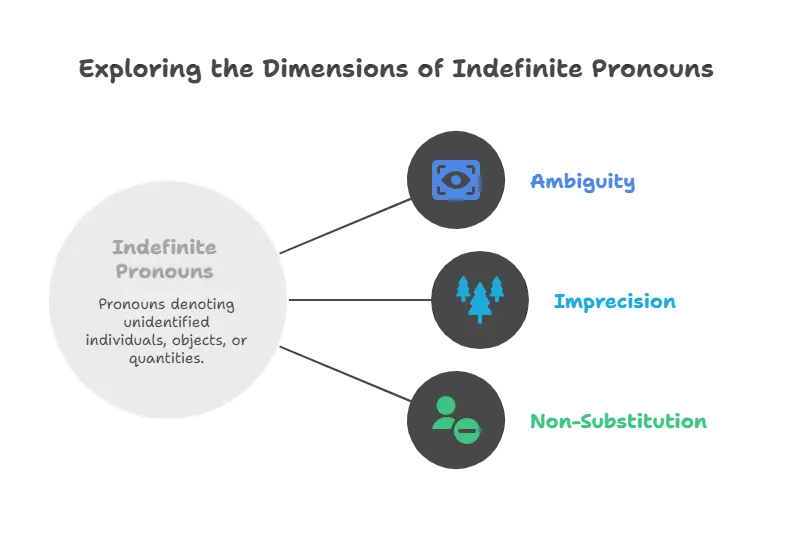Table of Contents
The usage of indefinite pronouns, which are often referred to as non-specific pronouns, is used in situations when we do not desire to specify a person, an item, or a quantity. They are useful in situations in which the exact identification is either unavailable, immaterial, or ambiguous on account of the circumstances. One should use the phrase “jemand hat angerufen,” which translates to “someone called,” rather than “Anna called.” Because they enable us to communicate about “someone,” “something,” or “nobody” in a way that is comprehensible and sounds natural, these types of pronouns are particularly crucial for daily German use.
Master the German Language with Entri App! Click Here for Free Trial Class!
What are Indefinite pronouns?
Indefinite pronouns, or “unbestimmte Fürwörter” in German, are pronouns that denote individuals, objects, or quantities that are not clearly identified. Indefinite pronouns vary from personal pronouns since they do not substitute a particular noun. Instead, they maintain an ambiguous or imprecise association.
eg:
-
Jemand – someone (but we don’t know who)
-
Etwas – something (not saying exactly what)
-
Niemand – nobody (no specific person)
Individuals use them in quotidian German when they want to avoid specifying whom or what they are referencing, or when they are unable to do so.
|
Goethe 2025 Exam Dates: Multiple Centers |
|
| Trivandrum Goethe Exam Dates | Kochi Goethe Exam Dates |
| Chennai Goethe Exam Dates | Coimbatore Goethe Exam Dates |
List of common German indefinite pronouns
1: How do you say "Good Morning" in German?
Indefinite pronouns in German manifest in several forms, each used to convey generic concepts such as someone, nothing, many, or all. Presented below is a compilation of the most prevalent items along with their definitions.
-
jemand – someone
-
niemand – nobody, no one
-
etwas – something
-
nichts – nothing
-
alle – all, everyone
-
jeder – everyone, each
-
man – one, people in general
-
keiner / keine – none, no one
-
irgendjemand – anyone, somebody
-
irgendetwas – anything, something
-
einige – some
-
viele – many
-
wenige – few
-
etliche – several
Free German A1 Mock Tests – Powered by AI!
Test your skills on our interactive platform. Get instant feedback from our AI to help you communicate better and track your progress. Start your free German mock test now.
Test Your German A1 for FreeHow are they used in sentences?
In the same way as nouns or personal pronouns may carry out the functions of subject, object, or complement in a sentence, indefinite pronouns in German are likewise capable of performing these functions. They make it easier to communicate all-encompassing ideas without referring to a specific person or thing, which is a significant benefit.
eg:
-
Jemand hat an der Tür geklingelt. → Someone rang the doorbell. (subject)
-
Ich habe etwas gegessen. → I ate something. (object)
-
Niemand war im Zimmer. → Nobody was in the room. (subject)
-
Man sagt, dass es regnet. → People say it’s raining. (impersonal use)
-
Alle sind willkommen. → Everyone is welcome. (plural use)
Singular vs Plural indefinite pronouns
There are several indefinite pronouns in German that are always single, while others might refer to groups or be multiple. Having this knowledge enables you to employ the appropriate form of the verb in a sentence.
Singular indefinite pronouns:
-
jemand – someone
-
niemand – nobody
-
etwas – something
-
nichts – nothing
-
man – one / people in general
-
jeder – everyone, each
eg:
-
Jemand ist draußen. → Someone is outside.
-
Niemand war da. → Nobody was there.
-
Man sagt, dass es wichtig ist. → People say it is important.
Plural indefinite pronouns:
-
alle – all, everyone
-
einige – some
-
viele – many
-
wenige – few
-
etliche – several
eg:
-
Alle sind hier. → Everyone is here.
-
Einige haben die Prüfung bestanden. → Some passed the exam.
-
Viele mögen Schokolade. → Many like chocolate.
|
German A2 Exercises – Download Free PDF |
||
Indefinite pronouns vs Personal pronouns
In German, you may use both generic and personal pronouns instead of words, although they have distinct jobs in the language. “Something” and “someone” are both vague terms since they don’t point to a particular person, item, or number. When you employ a personal term like er (he) or sie (she), it indicates something in the statement without being mentioned explicitly. If students know the distinction, they may be able to write and communicate more effectively in daily settings.
Indefinite Pronouns
- Make mention of unidentified people, things, or amounts.
- Never name a particular person or thing.
- Used when the subject is ambiguous, general, or irrelevant.
Eg:
-
Jemand klopft an die Tür. → Someone is knocking at the door.
-
Niemand weiß die Antwort. → Nobody knows the answer.
Individual pronouns
- Refer to a certain person, item, or organization that is already well-known in the setting.
- Replace the nouns that were previously expressed.
- Accept the gender, number, and case of the noun they substitute.
Eg:
-
Anna ist hier. Sie wartet draußen. → Anna is here. She is waiting outside.
-
Peter ruft an. Ich höre ihn. → Peter is calling. I hear him.
Master the German Language with Entri App! Click Here for Free Trial Class!
Free German A1 Mock Tests – Powered by AI!
Test your skills on our interactive platform. Get instant feedback from our AI to help you communicate better and track your progress. Start your free German mock test now.
Test Your German A1 for FreeConclusion
It is important to use ambiguous words in German when talking about people, things, or amounts in a general or vague way. Because of this, talks are more natural and flexible because people can share their thoughts without focusing on specific themes. Clear knowledge of the differences between personal pronouns and single and multiple vague pronouns is important for making sure that grammar is correct. If students learn vague words like jemand, niemand, etwas, and alle, they can clearly explain uncertainty, assumptions, or references they don’t know. This is an important skill for everyday German speech, and you can get it by learning these words.
Free German A1 Mock Tests – Powered by AI!
Test your skills on our interactive platform. Get instant feedback from our AI to help you communicate better and track your progress. Start your free German mock test now.
Test Your German A1 for FreeFrequently Asked Questions
Can indefinite pronouns be singular or plural?
Yes. Some are always singular (jemand, niemand), while others can be plural (alle, einige, viele).
Can indefinite pronouns be used as subjects and objects?
Yes, they can act as subjects, objects, or complements in a sentence.
How are indefinite pronouns different from personal pronouns?
Indefinite pronouns refer to unknown or general things/people, while personal pronouns refer to specific known nouns.
How do plural indefinite pronouns work with verbs?
Plural indefinite pronouns like alle or viele require plural verb forms.
Are indefinite pronouns always capitalized?
Yes, most German indefinite pronouns like Jemand, Niemand, or Etwas are capitalized because they are nouns.












